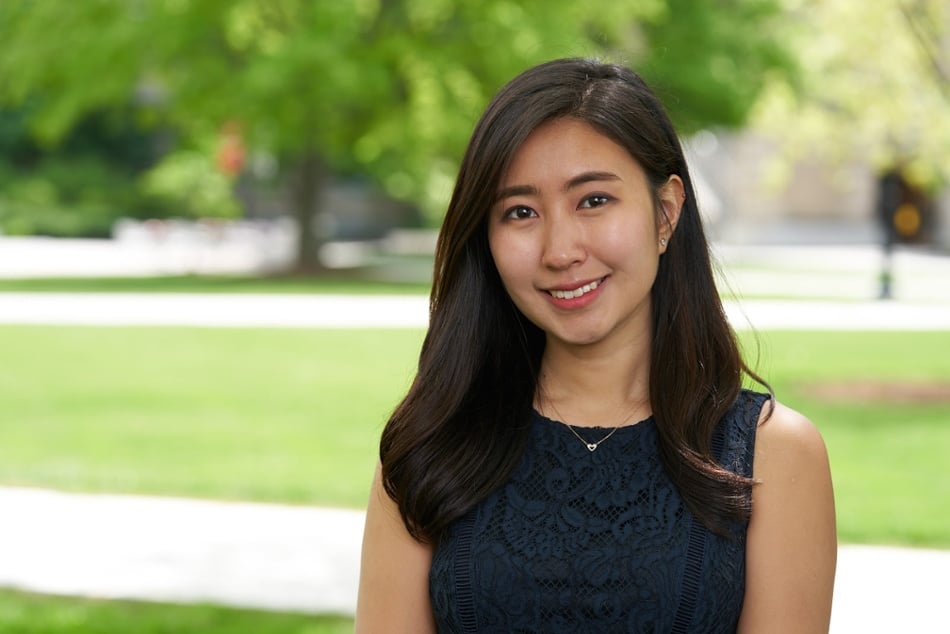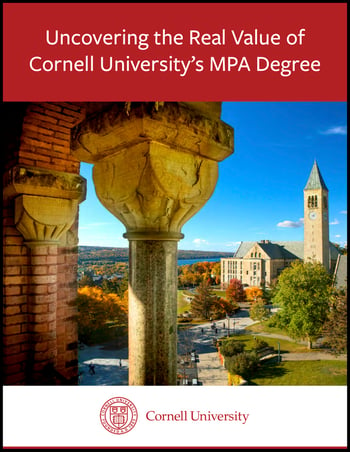People, Resources, and Connectedness — Reasons to Consider Cornell's MPA

Claudia Heeyeon Ro completed her Master of Public Administration at Cornell University in May 2019 with a concentration in Human Rights and Social Justice.
She is now employed as the Communications and Programming Assistant for the Migrations Taskforce in the Office of the Vice Provost for International Affairs at Cornell University. She is also the Communications Officer for Humanity Crew, an international organization specializing in the provision of psychological aid to refugees and people in crises.
What made you choose Cornell's MPA program over other programs you were considering?
At the time of accepting offers made by different graduate schools, I was 90 percent fixated on attending a Master of Science of Foreign Service program at another university, with the other 10 percent being CIPA. However, as I continued to give it more thought, CIPA seemed to be a better fit for me personally and professionally.
The biggest difference between the two programs was that CIPA was definitely more geared towards inclusion and diversity. The student profiles, description, and the curriculum that I read online gave me the impression that as an Asian-American woman, I would feel welcomed and belonged there.
Another difference was the flexibility of the curriculum; how much liberty I had in designing what my semester would look like, as well as having the concentration of my interest. CIPA’s Human Rights and Social Justice concentration allowed me to shape my degree program into a personalized one, despite its few mandatory courses that were a little tough. Lastly, the generous fellowship compared to other programs was also a crucial factor in making the decision to come to CIPA.
What are your long-term career goals? How did CIPA help prepare you for these?
My long-term career goal is to help displaced populations through international cooperation. Prior to coming to CIPA, I had a vague goal of wanting to help vulnerable people, but without a clear idea of who and how.
During my time at CIPA, through a number of different courses and projects, I was able to narrow this broad interest down to providing adequate emergency aid to the refugees in crisis, including mental health aid.
Aside from this big dream, I also hope to open my own bakery and hire local refugees as bakers. Through the bakery, I aspire to provide the refugees with employment opportunities and financial empowerment, as well as to raise public awareness of the global refugee crisis in a creative way. I hope that through my passion and efforts, more people properly understand the emergency refugee crisis and become aware of what we can do to give the displaced the gift of a normal life and mental health.
What would you say are the top three reasons that CIPA was a good fit for you?
The first reason has been and always will be the people in CIPA. Every single person I met at CIPA, including my fellow classmates, staff, and faculty members had nothing but a positive influence on me, and this was the best part of my CIPA experience.
The second reason will be the vast range of resources you can find from the university as a whole. Not only the written materials such as books and papers, but also the variety of events, seminars, talks, and conferences that are offered by Cornell has greatly benefited my studies for the past two years.
The last reason would be the program and the University’s well-connectedness. The strong alumni network that both CIPA and Cornell possess, as well as the opportunities to navigate the wide range of networks, serves crucial to us as graduates. The eagerness and supportive-ness that I was welcomed with when contacting alumni always proved to be beneficial, opening various doors of opportunities and professional connections.
What “stand out” experiences at CIPA made a lasting impact on you?
Having served as the President of the Class of 2019 was an extraordinary experience that shaped my two years at CIPA — quite differently than other students.
Aside from my academic experience at CIPA, the decision to take part in a student organization was definitely time-consuming and challenging at times, but it was one of the most rewarding things I have done here. Organizing social, professional, and academic events for my fellow students, interacting and collaborating with a number of different organizations in different departments, and working closely together with the staff and faculty members offered me the chance to hone my leadership skills as a Master of Public Administration.
Leadership, friendship, and professionalism are the three main things I have gotten out of this position that greatly enriched my past two years. I don’t think I can imagine my time at CIPA without the Cornell Public Affairs Society (CPAS), and I wouldn’t have felt as prepared as I am now to face the real world.
How would you describe the sense of community you find at CIPA?
The CIPA community to me has always been like a family. Since day one, the staff members have welcomed me and my classmates with a number of different opportunities to ‘bond’ with each other. At first, some of us wondered if this is what all graduate school programs were like — to always feel as if we were more than just a group of people in the same program at a school. However, as I worked my way through the two years, I spent more time with this new family than my actual family, and this community became the driving force of what helped me get through my studies and personal hardships.
As I am graduating, I know that all of us will be scattered domestically and internationally, but I feel very much reassured that I have another family out there in every corner of the world.
Please describe the role that the Capstone played in your educational experience.
The capstone program has been extremely helpful for me in honing my practical skills. For my project, I was a one-person team, and my client was the same client I had for my PADM 5900 Consulting Nonprofit and Government Organizations course. Since I have already worked with my client before, it was much easier to understand the organization itself and its needs. Working alone on the entire project was overwhelming from time to time, but it definitely helped me gain practical skills in consulting.
As the client organization’s mandate was fully aligned with my field of interest in international humanitarian aid, the project also provided me with the opportunity to learn more in-depth knowledge in the subject matter. Ultimately, my client and I formed a trustworthy relationship with each other through this project, and I have now accepted a job offer within the organization.
What advice would you like to share for students thinking about getting an MPA?
Although it is a bit corny, I would like to share with prospective students that life is what you make of it, and so is your time here at CIPA. Always seek more opportunities proactively, be open to diversity and new ideas, and learn from your classmates.
I have learned more from the people in CIPA than in the classroom itself, and they are the ones that motivate you to work harder every single day. They will become one of your greatest assets in life, and I cannot stress enough that they were then, and always will be the best part of my CIPA experience.
Is getting an MPA Worth It?
As you think about getting an MPA and wonder, “Is an MPA worth it?” remember this. Being a leader in public policy requires skills and tools that give you a competitive edge. You need tremendous critical thinking skills, policy expertise, and advanced preparation for management roles. But the payoff is world-changing. With a career in public affairs, you can help improve gender gaps and reform public policy in a way that benefits vulnerable populations everywhere.
Our Cornell MPA students go on to a myriad of jobs in public administration, human rights, and social justice. More than 90 percent of past graduates have found full-time employment or continued their education within nine months.
Are you interested yet? We welcome you to ask questions and request more information here! We can’t wait to see where your goals and our unique MPA concentrations converge.



